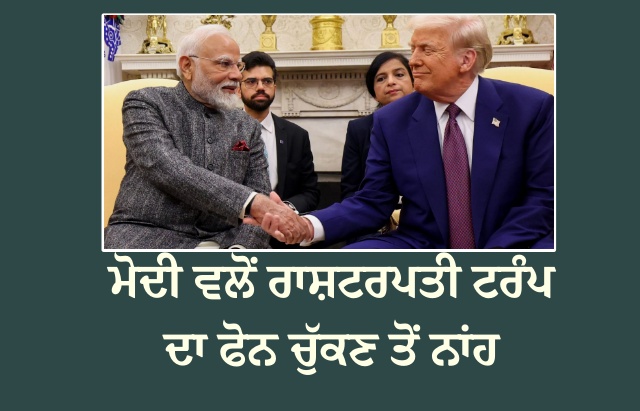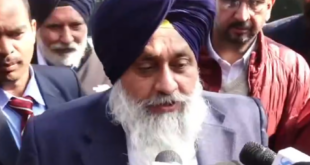Modi ‘ignoring’ Trump’s calls after tariffs crisis
Indian Prime Minister Narendra Modi reportedly did not answer four phone calls from U.S. President Donald Trump in recent weeks amid escalating tariff tensions, according to a German newspaper, Frankfurter Allgemeine Zeitung. This followed the U.S. imposing a 50% tariff on Indian goods—25% due to trade imbalances and an additional 25% as a penalty for India’s increased purchases of Russian oil, which now accounts for 45% of India’s oil imports, up from 0.2% before Russia’s 2022 invasion of Ukraine. The tariffs, effective from August 27, 2025, aim to pressure India over its economic ties with Russia, which Trump claims fuels Moscow’s “war machine.”
-ਪੁਲਿਸ ਦਾ ਫੋਨ ਨੰਬਰ ਵਰਤ ਕੇ ਮਾਰੀਆਂ ਜਾ ਰਹੀਆਂ ਨੇ ਠੱਗੀਆਂ
-ਟਰੰਪ ਪ੍ਰਸ਼ਾਸਨ ਵਲੋਂ ਕੁਝ ਸੂਬਿਆਂ ਨੂੰ ਫੰਡਿੰਗ ਬੰਦ ਕਰਨ ਦੀ ਧਮਕੀ
-ਮੋਦੀ ਵਲੋਂ ਰਾਸ਼ਟਰਪਤੀ ਟਰੰਪ ਦਾ ਫੋਨ ਚੁੱਕਣ ਤੋਂ ਨਾਂਹ
-ਪਹਿਲਗਾਮ ਹਮਲੇ ਨੂੰ ਭਾਰਤੀ ਮੇਜਰ ਜਨਰਲ ਨੇ ‘ਵੱਡਾ ਜਾਲ’ ਦੱਸਿਆ
-ਪੁਲਿਸ ਤੇ ਸਰਕਾਰ ਨੇ ਲੁਕੋਈ ਅੰਮ੍ਰਿਤਸਰ ਵਿਚਲੀ ਖਤਰਨਾਕ ਵਾਰਦਾਤ
-ਪੰਜਾਬ ‘ਚ ਹੜ੍ਹਾਂ ਕਾਰਨ ਤਬਾਹੀ ਹੀ ਤਬਾਹੀ
-ਦੋਸ਼ੀ ਪੁਲਿਸ ਮੁਲਾਜ਼ਮਾਂ ਨੂੰ ਬਚਾਉਣ ਦਾ ਅਮਲ ਸ਼ੁਰੂ
-ਸਰੀ ਅਤੇ ਨੌਰਥ ਵੈਨਕੂਵਰ ‘ਚ ਮੁੜ ਗੋਲੀਆਂ ਚੱਲੀਆਂ
-ਕੈਲਗਰੀ ਤੋਂ ਸਾਬਕਾ ਵਿਧਾਇਕ ਦੇ ਬੇਟੇ ਦੀ ਹਾਦਸੇ ‘ਚ ਮੌਤ
-ਅਮਰੀਕਾ ਵਲੋਂ ਪਰਵਾਸੀਆਂ ‘ਤੇ ਵਧੇਰੇ ਸਖਤੀ ਦੇ ਸੰਕੇਤ
-ਸੌਦਾ ਸਾਧ ਦੇ ਦੰਗਈ ਚੇਲੇ ਕਨੂੰਨ ਦੀ ਮਾਰ ਤੋਂ ਬਾਹਰ
-ਯੂਨੀਵਰਸਿਟੀ ਦੇ ਵਾਈਸ ਚਾਂਸਲਰ ਦੀ ਜਥੇਦਾਰ ਅੱਗੇ ਪੇਸ਼ੀ ਹੋਈ
ਭਾਰਤੀ ਪ੍ਰਧਾਨ ਮੰਤਰੀ ਨਰਿੰਦਰ ਮੋਦੀ ਨੇ ਹਾਲ ਹੀ ਦੇ ਹਫਤਿਆਂ ਵਿੱਚ ਅਮਰੀਕੀ ਰਾਸ਼ਟਰਪਤੀ ਡੋਨਾਲਡ ਟਰੰਪ ਦੇ ਚਾਰ ਫੋਨ ਕਾਲਾਂ ਦਾ ਜਵਾਬ ਨਹੀਂ ਦਿੱਤਾ, ਜਰਮਨ ਅਖਬਾਰ ਫਰੈਂਕਫਰਟਰ ਅਲਗੇਮਾਈਨ ਜ਼ੀਟੁੰਗ ਦੇ ਅਨੁਸਾਰ, ਜਦੋਂ ਟੈਰਿਫ ਸੰਕਟ ਵਧਿਆ। ਅਮਰੀਕਾ ਨੇ 27 ਅਗਸਤ 2025 ਤੋਂ ਭਾਰਤੀ ਵਸਤੂਆਂ ‘ਤੇ 50% ਟੈਰਿਫ ਲਗਾਇਆ—25% ਵਪਾਰ ਅਸੰਤੁਲਨ ਕਾਰਨ ਅਤੇ 25% ਜੁਰਮਾਨੇ ਵਜੋਂ, ਕਿਉਂਕਿ ਭਾਰਤ ਨੇ ਰੂਸੀ ਤੇਲ ਦੀ ਖਰੀਦ ਵਧਾਈ, ਜੋ ਹੁਣ ਭਾਰਤ ਦੇ ਤੇਲ ਆਯਾਤ ਦਾ 45% ਹੈ, ਜੋ 2022 ਵਿੱਚ ਰੂਸ ਦੇ ਯੂਕਰੇਨ ‘ਤੇ ਹਮਲੇ ਤੋਂ ਪਹਿਲਾਂ 0.2% ਸੀ। ਇਹ ਟੈਰਿਫ ਭਾਰਤ ‘ਤੇ ਰੂਸ ਨਾਲ ਆਰਥਿਕ ਸਬੰਧਾਂ ਕਾਰਨ ਦਬਾਅ ਪਾਉਣ ਦੀ ਕੋਸ਼ਿਸ਼ ਹਨ, ਜਿਸ ਨੂੰ ਟਰੰਪ ਨੇ ਮਾਸਕੋ ਦੀ “ਜੰਗੀ ਮਸ਼ੀਨ” ਨੂੰ ਸਮਰਥਨ ਦੇਣ ਵਾਲਾ ਦੱਸਿਆ।ਮੋਦੀ ਦਾ ਟਰੰਪ ਦੇ ਕਾਲ ਨਾ ਲੈਣਾ ਨਾਰਾਜ਼ਗੀ ਅਤੇ ਰਣਨੀਤਕ ਸਾਵਧਾਨੀ ਨੂੰ ਦਰਸਾਉਂਦਾ ਹੈ, ਕਿਉਂਕਿ ਭਾਰਤ ਅਮਰੀਕੀ ਮੰਗਾਂ—ਖੇਤੀਬਾੜੀ ਅਤੇ ਡੇਅਰੀ ਬਜ਼ਾਰ ਖੋਲ੍ਹਣ ਅਤੇ ਰੂਸੀ ਤੇਲ ਆਯਾਤ ਘਟਾਉਣ—ਦਾ ਵਿਰੋਧ ਕਰ ਰਿਹਾ ਹੈ। ਭਾਰਤ ਦੇ ਵਿਦੇਸ਼ ਮੰਤਰਾਲੇ ਨੇ ਟੈਰਿਫ ਨੂੰ “ਅਨੁਚਿਤ, ਅਣਉਚਿਤ, ਅਤੇ ਗੈਰ-ਵਾਜਬ” ਕਿਹਾ, ਨੋਟ ਕਰਦੇ ਹੋਏ ਕਿ ਚੀਨ ਅਤੇ ਤੁਰਕੀ ਵਰਗੇ ਦੇਸ਼ਾਂ ਨੂੰ ਸਮਾਨ ਰੂਸੀ ਤੇਲ ਖਰੀਦ ਲਈ ਘੱਟ ਜਾਂਚ ਦਾ ਸਾਹਮਣਾ ਕਰਨਾ ਪੈਂਦਾ ਹੈ। ਮੋਦੀ ਨੇ ਕਿਸਾਨਾਂ ਦੀ ਸੁਰੱਖਿਆ ‘ਤੇ ਜ਼ੋਰ ਦਿੱਤਾ, ਕਿਹਾ, “ਭਾਰਤ ਕਦੇ ਵੀ ਆਪਣੇ ਕਿਸਾਨਾਂ, ਮਛੇਰਿਆਂ, ਅਤੇ ਡੇਅਰੀ ਕਿਸਾਨਾਂ ਦੇ ਹਿੱਤਾਂ ਨਾਲ ਸਮਝੌਤਾ ਨਹੀਂ ਕਰੇਗਾ,” ਭਾਵੇਂ ਇਸਦੀ “ਭਾਰੀ ਕੀਮਤ” ਚੁਕਾਉਣੀ ਪਵੇ।

ਅਮਰੀਕਾ ਭਾਰਤ ਦਾ ਸਭ ਤੋਂ ਵੱਡਾ ਨਿਰਯਾਤ ਬਜ਼ਾਰ ਹੈ, ਜਿਸ ਨੇ 2024 ਵਿੱਚ 87 ਅਰਬ ਡਾਲਰ ਦੀਆਂ ਵਸਤੂਆਂ ਭੇਜੀਆਂ, ਅਤੇ ਟੈਰਿਫ ਨਾਲ ਟੈਕਸਟਾਈਲ, ਆਟੋ-ਕੰਪੋਨੈਂਟਸ, ਅਤੇ ਰਤਨਾਂ ਵਰਗੇ ਸੈਕਟਰਾਂ ‘ਤੇ ਵੱਡਾ ਅਸਰ ਪੈ ਸਕਦਾ ਹੈ। ਭਾਰਤੀ ਵਾਰਤਾਕਾਰ ਟੈਰਿਫ ਦੇ ਪੂਰੇ ਅਸਰ ਤੋਂ ਪਹਿਲਾਂ ਹੱਲ ਲੱਭਣ ਦੀ ਕੋਸ਼ਿਸ਼ ਕਰ ਰਹੇ ਹਨ, ਜਦਕਿ ਮੋਦੀ ਚੀਨ ਨਾਲ ਨਜ਼ਦੀਕੀ ਸਬੰਧਾਂ ਦੀ ਖੋਜ ਕਰ ਰਹੇ ਹਨ, 2018 ਤੋਂ ਬਾਅਦ ਪਹਿਲੀ ਵਾਰ ਚੀਨ ਦੀ ਯਾਤਰਾ ਦੀ ਯੋਜਨਾ ਬਣਾ ਰਹੇ ਹਨ ਅਤੇ ਅਮਰੀਕੀ ਦਬਾਅ ਦਾ ਮੁਕਾਬਲਾ ਕਰਨ ਲਈ ਬ੍ਰਿਕਸ ਦੇਸ਼ਾਂ ਨਾਲ ਸੰਪਰਕ ਵਧਾ ਰਹੇ ਹਨ। ਇਸ ਦੌਰਾਨ, ਭਾਰਤ ਵਿੱਚ ਘਰੇਲੂ ਆਲੋਚਕ ਟਰੰਪ ‘ਤੇ “ਆਰਥਿਕ ਬਲੈਕਮੇਲ” ਦਾ ਦੋਸ਼ ਲਗਾ ਰਹੇ ਹਨ, ਅਤੇ ਸਵਦੇਸ਼ੀ ਜਾਗਰਣ ਮੰਚ ਸਮੇਤ ਕੁਝ ਆਵਾਜ਼ਾਂ ਅਮਰੀਕੀ ਬ੍ਰਾਂਡਾਂ ਦੇ ਬਾਈਕਾਟ ਦੀ ਮੰਗ ਕਰ ਰਹੀਆਂ ਹਨ।ਅਮਰੀਕਾ-ਭਾਰਤ ਸਬੰਧਾਂ ਵਿੱਚ ਤਣਾਅ, ਜੋ ਕਦੇ ਮੋਦੀ-ਟਰੰਪ ਦੀ ਮਜ਼ਬੂਤ ਦੋਸਤੀ ਨਾਲ ਜੁੜੇ ਸਨ, ਨੂੰ ਟਰੰਪ ਦੇ ਮਈ 2025 ਦੇ ਭਾਰਤ-ਪਾਕਿਸਤਾਨ ਸੀਜ਼ਫਾਇਰ ਦੀ ਦਲਾਲੀ ਦੇ ਦਾਅਵੇ ਨੇ ਹੋਰ ਜਟਿਲ ਕਰ ਦਿੱਤਾ ਹੈ, ਜਿਸ ਨੂੰ ਮੋਦੀ ਨੇ ਇਸਲਾਮਾਬਾਦ ਨਾਲ ਸਿੱਧੀਆਂ ਗੱਲਬਾਤ ਦਾ ਨਤੀਜਾ ਦੱਸਦੇ ਹੋਏ ਖਾਰਜ ਕੀਤਾ। ਟਰੰਪ ਦੇ ਪਾਕਿਸਤਾਨ ਪ੍ਰਤੀ ਸਕਾਰਾਤਮਕ ਇਸ਼ਾਰਿਆਂ ਨੇ ਵੀ ਇਸ ਦਰਾਰ ਨੂੰ ਹੋਰ ਡੂੰਘਾ ਕੀਤਾ ਹੈ।
Modi’s refusal to take Trump’s calls reflects both frustration and strategic caution, as India resists U.S. demands to open its agriculture and dairy markets and reduce Russian oil imports. India’s foreign ministry called the tariffs “unfair, unjustified, and unreasonable,” noting that other countries, like China and Turkey, face less scrutiny for similar Russian oil purchases. Modi has emphasized protecting India’s farmers, stating,
“India will never compromise on the interests of its farmers, fishermen, and dairy farmers,” even if it means paying a “heavy price.” The U.S. is India’s largest export market, with $87 billion in goods shipped in 2024, and the tariffs could significantly impact sectors like textiles, auto-components, and gems. Indian negotiators are seeking a resolution before the full tariff impact, while Modi is also exploring closer ties with China, planning a visit—the first since 2018—and engaging with BRICS nations to counter U.S. pressure. Meanwhile, domestic criticism in India accuses Trump of “economic blackmail,” and some voices, including the Swadeshi Jagran Manch, are pushing for boycotts of American brands.The strain in U.S.-India relations, once marked by a strong Modi-Trump rapport, is further complicated by Trump’s claim of brokering a May 2025 India-Pakistan ceasefire, which Modi disputes, asserting it followed direct talks with Islamabad. This, alongside Trump’s favorable gestures toward Pakistan, has deepened the rift.


